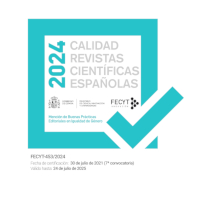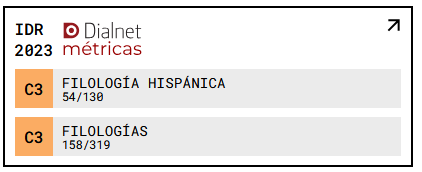Euphemism and Dysphemism during the War of the Spanish Succession (1710-1713): George Ridpath
DOI:
https://doi.org/10.18172/cif.2959Keywords:
euphemism, dysphemism, George Ridpath, political writings, War of the Spanish SuccessionAbstract
Euphemism and dysphemism are common within political communication as the former is a linguistic make-up leading to deception and distortion of reality (Rodríguez González 1991: 90) whereas the latter highlights the most pejorative traits of the taboo with an offensive aim (Crespo-Fernández 2015: 2). Considering this, I have analysed euphemism and dysphemism in George Ridpath’s political writings during the War of the Spanish Succession (1710-1713), in a corpus comprising two journals (The Observator and The Flying Post), and examined how this author used language to shape and manipulate Great Britain’s public opinion during the Stuart period. To this end, I have followed Taboada and Grieve’s (2004) approach of Appraisal Theory (Martin and White 2005) as well as Politeness Theory (Brown and Levinson 1987), Face Theory (Goffman 1967), Charteris-Black’s Critical Metaphor Analysis (2005: 45) and Conceptual Metaphor Theory (Gibbs 2011). The findings show that Ridpath used x-phemistic language to positively self-present the ingroup and negatively other-present the outgroup.Downloads
References
ABRANTES, A. M. (2005). “Euphemism and Co-operation in Discourse” in Power without Domination, Dialogism and the Empowering Property of Communication. (Ed. E. Grillo). Amsterdam/New York: John Benjamins. DOI: https://doi.org/10.1075/dapsac.12.05abr
ALBAREDA SALVADÓ, J. (2010). La Guerra de Sucesión de España (1710-1714). Barcelona: Crítica.
ALLAN, K. and BURRIDGE, K. (2006). Forbidden Words: Taboo and the Censoring of Language. Cambridge: Cambridge University Press. DOI: https://doi.org/10.1017/CBO9780511617881
AUCHTER, D. (2001). Dictionary of Literary and Dramatic Censorship in Tudor and Stuart England. Westport, CT: Greenwood Press.
BARKER, H. (2000). Newspapers, Politics and English Society 1695-1855. Harlow: Longman.
BLACK, J. (2001). The English Press 1621-1861. Gloucestershire: Sutton Publishing.
BODEN, S. (2004). Persuasive Dialogues in Shakespeare’s Dramatic Work. Jena: University Friedrich Schiller.
BROWN, P. and LEVINSON, S. C. (1987). Politeness. Some Universals in Language Use. Cambridge: Cambridge University Press. DOI: https://doi.org/10.1017/CBO9780511813085
BURGEN, S. (1996). Your Mother’s Tongue. London: Indigo.
CASAS GÓMEZ, M. (2009). “Towards a New Approach to the Linguistic Definition of Euphemism”. Language Sciences 31: 725-739. DOI: https://doi.org/10.1016/j.langsci.2009.05.001
CASAS GÓMEZ, M. (2012). “The Expressive Creativity of Euphemism and Dysphemism”. Lexis. Journal in English Lexicology 7: 43-64. DOI: https://doi.org/10.4000/lexis.349
CHAMIZO DOMÍNGUEZ, P. J. (2004). “La función social y cognitiva del eufemismo y del disfemismo”. Panace@ 15: 45-51.
CHARTERIS-BLACK, J. (2005). Politicians and Rhetoric. The Persuasive Power of Metaphor (2nd edition). Basingstoke/New York: Palgrave MacMillan. DOI: https://doi.org/10.1057/9780230501706
CHARTERIS-LACK, J. (2016). Fire Metaphors. Discourses of Awe and Authority. London/New York: Bloomsbury.
CHILTON, P. (2004). Analysing Political Discourse. Theory and Practice. London/New York: Routledge. DOI: https://doi.org/10.4324/9780203561218
CRESPO-FERNÁNDEZ, E. (2013). “Words as Weapons for Mass Persuasion: Dysphemism in Churchill’s Wartime Speeches”. Text & Talk 33 (3): 311-330. DOI: https://doi.org/10.1515/text-2013-0014
CRESPO-FERNÁNDEZ, E. (2014). “Euphemism and Political Discourse in the British Regional Press”. Brno Studies in English 40 (1): 5-26. DOI: https://doi.org/10.5817/BSE2014-1-1
CRESPO-FERNÁNDEZ, E. (2015). Sex in Language. Euphemistic and Dysphemistic Metaphors in Internet Forums. London/New York: Bloomsbury.
CRESPO-FERNÁNDEZ, E. and LÓPEZ CAMPILLO, R. M. (2011). “Persuasive Rhetoric in George Ridpath’s Political Writings”. ES Revista de Filología Inglesa 32: 43-67.
DUNTON, J. (1818). The Life and Errors of John Dunton, Citizen of London with the Lives and Characteristics of More than a Thousand Contemporary Divines, and Other Persons of Literary Eminence. Vol. II. London: J. Nichols, son, and Bentley.
GIBBS, R. W. (2011). “Evaluating Conceptual Metaphor Theory”. Discourse Processes 48 (8): 529-562. DOI: https://doi.org/10.1080/0163853X.2011.606103
GOATLY, A. (2006). “Humans, Animals and Metaphors”. Society and Animals 14 (1): 15-37. DOI: https://doi.org/10.1163/156853006776137131
GOFFMAN, E. (1967). Interaction Ritual: Essays on Face-to-Face Behaviour. New York: Double Day.
HATTENDORF, J. B. (1987). England in the War of the Spanish Succession. A Study of the English View and Conduct of Grand Strategy, 1702-1712. New York: Garland Publishing.
HOLMES, G. (1987). British Politics in the Age of Anne. London: The Hambledon Press.
KÖVECSES, Z. (2006). “Metaphor and Ideology in Slang: The Case of woman and man”. Revue d’Études Françaises 11: 151-166.
KÖVECSES, Z. (2010). “Metaphor and Culture”. Acta Universitatis Sapientiae, Philologica 2 (2): 197-220.
KÖVECSES, Z. and RADDEN, G. (1998). “Metonymy: Developing a Cognitive Linguistic View”. Cognitive Linguistics 9: 37-77. DOI: https://doi.org/10.1515/cogl.1998.9.1.37
KRÖLL, H. (1984). O eufemismo e o disfemismo no portugués moderno. Lisboa: Instituto de Cultura e Língua Portuguesa.
LAKOFF, G. (1993). “The Contemporary Theory of Metaphor” in Metaphor and Thought. (Ed. A. Ortony). Cambridge: Cambridge University Press. DOI: https://doi.org/10.1017/CBO9781139173865.013
LAKOFF, G. and JOHNSON, M. (1980). Metaphors We Live By. Chicago: The University of Chicago Press.
LAKOFF, G. and TURNER, M. (1989). More than a Cool Reason. A Field Guide to Poetic Metaphor. Chicago: The University of Chicago Press. DOI: https://doi.org/10.7208/chicago/9780226470986.001.0001
LEE, W. (1869). The Life of Daniel Defoe. London: John Camden Rotter.
LÓPEZ CAMPILLO, R. M. (2009). “La Guerra de Sucesión Española: Opinión pública y propaganda política en Gran Bretaña durante el reinado de Ana Estuardo”. ENSAYOS, Revista de la Facultad de Educación de Albacete 24: 185-197.
LÓPEZ CAMPILLO, R. M. (2010). Daniel Defoe y la Guerra de Sucesión Española. Michigan: ProQuest.
LOSA SERRANO, P. and LÓPEZ CAMPILLO, R. M. (2007). “La Guerra de Sucesión Española: Swift, Defoe y la campaña para la paz”. Revista Estudis 33: 175-192.
LUTZ, W. (1987). “Doublespeak at Large”. English Today 12: 20-24. DOI: https://doi.org/10.1017/S0266078400003072
MARTIN, J. R. (2000). “Beyond Exchange: Appraisal Systems in English” in Evaluation in Text. (Eds. S. Hunston and G. Thompson). Oxford: Oxford University Press.
MARTIN, J. R. and WHITE, P. R. R. (2005). The Language of Evaluation. Appraisal in English. Hampshire/New York: Palgrave Macmillan. DOI: https://doi.org/10.1057/9780230511910
MCGLONE, M. and BATCHELOR, J. A. (2003). “Looking Out for Number One: Euphemism and Face”. Journal of Communication 53: 251-264. DOI: https://doi.org/10.1111/j.1460-2466.2003.tb02589.x
MCLEOD, W. R. and MCLEOD, V. B. (1979). Anglo-Scottish Tract, 1701-1714. A Descriptive Checklist Compiled by W. R. and V. B. McLeod. Lawrence: University of Kansas Publications.
MÜLLENBROCK, H. J. (1997). The Culture of Contention. A Rhetorical Analysis of the Public Controversy about the Ending of the War of the Spanish Succession, 1710-1713. Munich: Fink.
RIDPATH, G. (1709-1710). The Observator. Eighth volume. London: B. Bragge.
RIDPATH, G. (1710). The Observator. Ninth volume. B. Bragge, R. Janemay, S. Popping.
RIDPATH, G. (1711a). The Flying Post: or, the Post-master, 3032-3146. London: William Hurt.
RIDPATH, G. (1711b). The Observator. Tenth volume. London: S. Popping.
RIDPATH, G. (1711-1712). The Observator. Eleventh volume. London: S. Popping, William Hurt.
RIDPATH, G. (1712). The Flying Post: or, the Post-master, 3186-3316. London: William Hurt.
RIDPATH, G. (1713-1714). The Flying Post: or, the Post-master, 3319-3434. London: William Hurt.
RODRÍGUEZ GONZÁLEZ, F. (1991). Prensa y lenguaje político. Alicante: Instituto de Cultura Juan Gil-Albert.
RUIZ DE MENDOZA IBÁÑEZ, F. J. (2000). “The Role of Mappings and Domains in Understanding Metonymy” in Metaphor and Metonymy at the Crossroads. (Ed. A. Barcelona). Berlin/New York: Mouton de Gruyter.
RUIZ DE MENDOZA IBÁÑEZ, F. J. and GALERA-MASEGOSA, A. (2011). “Going beyond Metaphtonymy: Metaphoric and Metonymic Complexes in Phrasal Verb Interpretation”. Language Value 3 (1): 1-29. DOI: https://doi.org/10.6035/LanguageV.2011.3.2
RUIZ DE MENDOZA IBÁÑEZ, F. J. and PÉREZ HERNÁNEZ, L. (2011). “The Contemporary Theory of Metaphor: Myths, Developments and Challenges”. Metaphor and Symbol 26: 161-185. DOI: https://doi.org/10.1080/10926488.2011.583189
SÁNCHEZ RUIZ, R. (2015). “George Ridpath’s Use of Evaluative Adjectives as Manipulative and Persuasive Strategies during the War of the Spanish Succession (1710-1713)”. Journal of English Studies 13: 109-134. DOI: https://doi.org/10.18172/jes.2738
SÁNCHEZ RUIZ, R. and LÓPEZ CIRUGEDA, I. (2015). “Persuasion and Manipulation through Conceptual Metaphors in George Ridpath’s Political Writings (1707-1709)”. US-China Foreign Language 13 (6): 397-411. DOI: https://doi.org/10.17265/1539-8080/2015.06.001
SPECK, W. A. (1970). Tory and Whig. The Struggle in the Constituencies 1701-1715. London: MacMillan. SWIFT, J. (1711). The Examiner 42.
TABOADA, M. and GRIEVE, J. (2004). “Analyzing Appraisal Automatically”. Proceedings of AAAI Spring Symposium on Attitude and Affect in Text: 158-161.
TREVELYAN, G. M. (1965). England under Queen Anne. Volumes I-III. London: Longmans, Green and Co.
VAN DIJK, T. A. (1997). “What is Political Discourse Analysis?” in Political Linguistics (Comps. J. Blommaert and C. Bulcaen). Amsterdam/Philadelphia: John Benjamins. DOI: https://doi.org/10.1075/bjl.11.03dij
VAN DIJK, T. A. (1999). Ideología: Una aproximación multidisciplinaria. Barcelona: Gedisa.
WILSON, W. (1830). Memoirs of the Life and Times of Daniel De Foe: Containing a Review of his Writings and his Opinions upon a Variety of Important Matters, Civil and Ecclesiastical. London: Hurst, Chance and Co.
Downloads
Published
How to Cite
Issue
Section
License
The authors retain copyright of articles and authorize CIF the first publication. They are free to share and redistribute the article without obtaining permission from the publisher as long as they give appropriate credit to the editor and the journal.
Self-archiving is allowed too. In fact, it is recommendable to deposit a PDF version of the paper in academic and/or institutional repositories.
It is recommended to include the DOI number.
This journal is licensed under a Creative Commons Attribution 4.0 International License














